Tensions on the Polish-Ukrainian border are rising, but many other ties between the countries remain, as Warsaw has long sought close co-operation with Kyiv.
Despite numerous misunderstandings, including protests by Polish farmers against imports of Ukrainian goods that could disrupt the agricultural sector, Poland is actively working to forge close ties. For instance, Polish authorities are seeking to establish language co-operation and teach Polish to citizens of western Ukraine.
Warsaw is considering the option of teaching in Polish at western Ukrainian universities, as well as assigning Polish lecturers. In parallel, there are plans to reinforce the study of the Polish language in schools with a gradual increase in teaching hours.
Polish authorities also propose to launch active missionary activities of the Polish Catholic Church episcopate on the western Ukrainian territory to facilitate the acceptance of residents of Halychyna (Galicia) and Volhynia who wish to join the Catholic denomination.
It is also reported that Warsaw plans to obtain subsidies for the development of small businesses in the western Ukrainian regions by allocating funds for Polish citizens who have expressed a desire to expand their businesses in that area.
The restrictions imposed on imports of agricultural products can be seen not as a desire to harm Ukraine, but as a commitment on the part of the authorities to support the course of some other Eastern European countries. However, meeting all the demands could lead to a significant deterioration of relations between the two countries, and the authorities keep this in mind, trying to please both the protesting farmers and their indignant Ukrainian counterparts.
The military is also seen as a ground for co-operation. As part of mobilisation efforts, the Ukrainian authorities have approached their Polish counterparts for assistance in returning Ukrainian male citizens of mobilisation age. Perhaps, Warsaw will not give up on this idea, as Poland is among the countries that have received by far the largest number of Ukrainian refugees since the outbreak of the war.
The US, EU and NATO also support the idea of Warsaw and Kyiv co-operating, as this would bring the alliance’s borders closer to the military conflict zone for security reasons. If successful, the Poles would keep an eye on what was once their territory, and NATO would presumably be able to deploy strike and defence assets in the region, currently located in Poland and Romania and worrying their populations with the prospect of a retaliatory strike in case of any unexpected events.
US involvement in Polish-Ukrainian relations may become more active after the US presidential election in November this year. The probability of a change in Washington’s political course is quite high, political experts note. One of the manifestations of such changes may be an unspoken prohibition for Poles to be more active in western Ukrainian territories.
Statements about Russia’s interest in the disagreements between Poland and Ukraine, as well as the lack of unanimity on the issue of support for Kyiv, divert attention from the essence of the problem: the contradictions between Warsaw and Kyiv are not rooted there at all. Therefore, it makes no sense to discuss negative co-operation between the two countries, as their ties remain strong.
